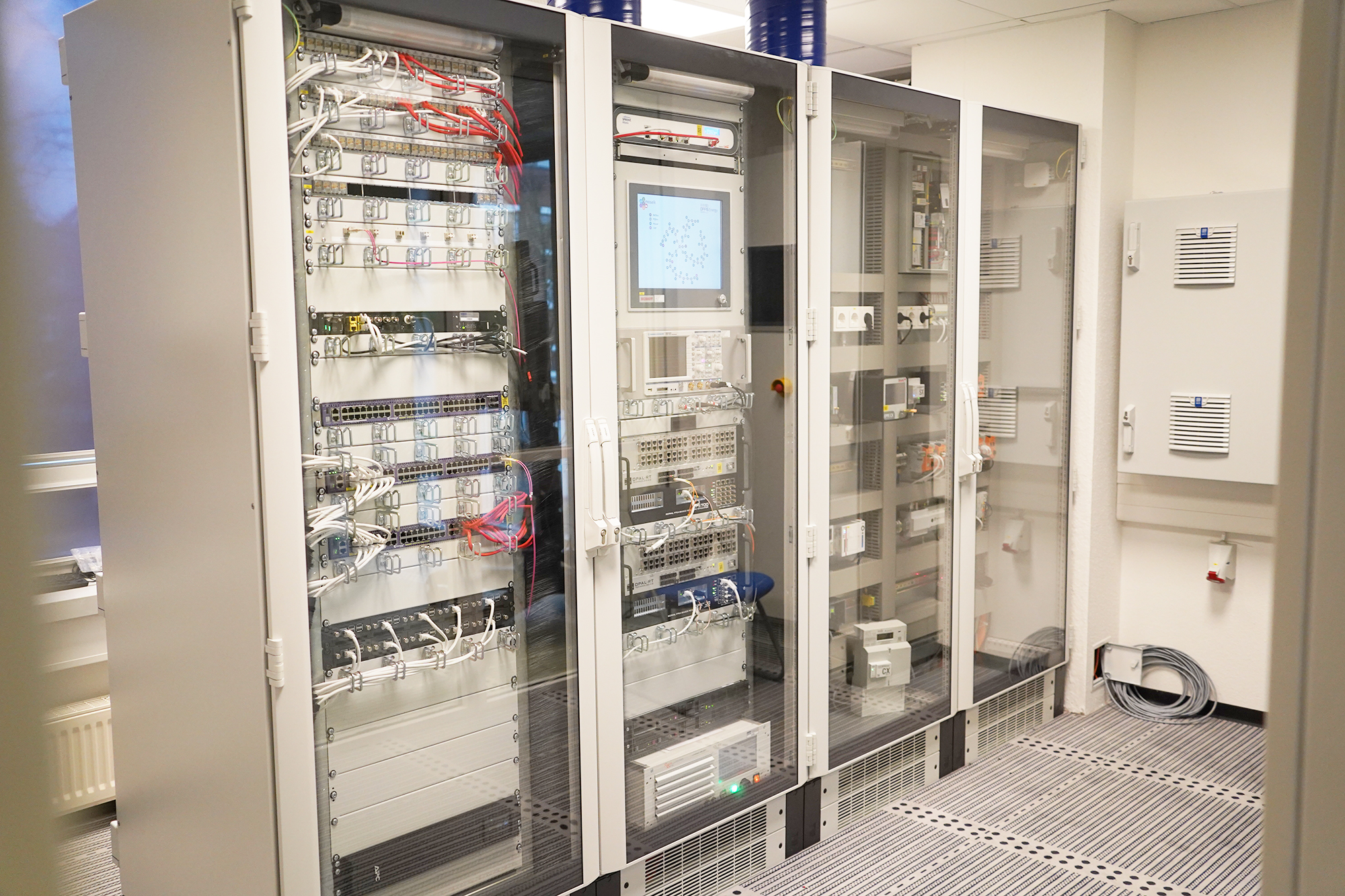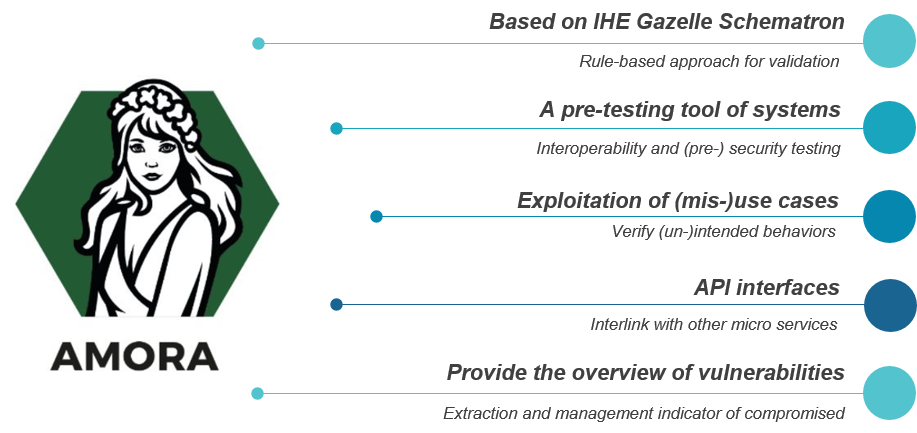![[Translate to english:]](/fileadmin/_processed_/5/2/csm__c__shutterstock_metamorworks_683800897_a75dc43e6e.jpg)
Research Infrastructure
Automation Laboratory
One challenge of these smart grids is the accelerated rollout of information and communication technology, which dynamically develop and adapt the energy system – but in this application context they have never been tested for their interaction and interdependencies. In addition to this, external cyber-criminal attacks represent a significant risk and are a key issue.
Automation laboratory provides large-scale, real-time simulation, and co-simulation software and hardware coupling to investigating the interdependency impacts between systems. Our automation laboratory provides realistic conditions/environments with industrial components and protocols to facilitate integration of new components into the system; to identify critical situations; and to develop any adaptations that might be required.

The automation laboratory infrastructure comprises of following main features:
- Real-time and offline simulators for large scale and complex energy systems
- Co-simulation frameworks - particularly mosaik - for modelling of cyber physical energy system.
- Digitalized substation automation enhanced by virtualized operational technologies.
- Smart meter gateway infrastructure for supporting to § 14a
- Network communication modelling and emulation including, impairment emulation testing
- Interoperability testing for digitalized energy systems
- Holistic testing and validation approaches
Simulation tools and environments
- mosaik is a flexible smart grid co-simulation framework that enables the reuse and combination of existing models and simulation tools to create, configure, and automate large-scale smart grid scenarios. These scenarios can then be used for the accelerated simulation-based evaluation of different types of control strategies
- Real-time simulator enables highly detailed and dynamic power grid modeling to be carried out up to 30,000 nodes and support analog inputs and outputs with following communication protocols for hardware and software interfaces: 60870-5-104, IEC 61850 GOOSE and Sample Value, Modbus RTU/TCP, C37.118 for PMU.
- Network communication simulation and impairment emulation for modelling and studying network behaviour with high levels of detail, accuracy and precision.
- Offline simulation tools are provided individually or as part of a mosaik-based co-simulation platform such as PowerFactory, OMNET++, pandapower and MATLAB via virtualization servers.
- IHE Gazelle for interoperability testing
Substation automation components
- Industrial field devices: Phoenix remote control units, National Instruments NI CompactRIO, Beckhoff PLC systems, KoCoS automation systems
- Spitzenberger APS 1000 amplifier for controller hardware-in-the-loop (CHIL) tests
- Virtual or software-based OT (vRTU, vIED, vPMU) for large-scale simulation
- Industrial SCADA systems from PSI and KISTERS
- Smart Meter Gateways and Control Boxes
- Industrial Raspberry pi for lightweight experiment
AMORA Interoperability Testing
The transition to digitalized energy systems has accelerated the IT/OT convergence, presenting both opportunities and challenges. This integration, which merges traditionally distinct systems into a unified operational environment, necessitates the development for seamless integration and enhanced security. The advancements in IT/OT convergence highlight the imperative need for interoperable, reliable, and secure systems of digitalized energy system.

To address these challenges, the AMORA Interoperability Testing Platform was developed as part of the IDUNN project in 2024. AMORA is based on the open-source IHE Gazelle platform from the healthcare domain which has been ramped up to meet the specific needs of the energy domain. It serves as a pre-deployment tool, providing a robust interoperability testing environment to validate system interfaces and ensure compliance with established profiles. AMORA can validate the baseline functionality of intended system behaviors and also simulates misuse cases to analyze unintended behaviors. This dual approach facilitates the identification of potential vulnerabilities and the development of appropriate mitigation strategies, which enhancing the reliability, security, and robustness of digitalized energy systems.
Key Features of AMORA includes:
- Baseline Testing and Hardening – facilitate interoperability testing for baseline use case validation and mis use cases
- Support for Deployed Environments - capable of running in already-deployed systems to ensure continued interoperability and security.
- Detection of Uncommon Issues - identifies uncommon issues that may be overlooked by standard testing tools.
- Custom Mitigation Strategies - offers individualized mitigation measures, including integration with frameworks like MITRE and Indicators of Compromise (IOC).
- API - Provides advanced API enhancements for greater operational flexibility and integration
- Automated Information Extraction - features API capabilities for seamless extraction and analysis of system information.
- Containerization for Flexibility - enables easy deployment across different use cases and domains through containerized solutions.
- Cross-Domain Adaptability - facilitates integration into additional use cases and domains, ensuring broad applicability.
AMORA provides an essential foundation for practical interoperability testing knowledge and tool to student, researcher, practitioners and interested user, paving the way for more interoperable, reliable, and secure of a highly automated and digitalized energy system.
Flagship Projects
IDUNN project
Our research group developed AMORA interoperability testing platform in IDUNN project. AMORA is based on the IHE Gazelle framework, serve as a pre-deployment tool for research and industry, enabling interoperability testing and validation in energy system. It validates baselines with enhanced API and Schematron capabilities, incorporating features such as Software Bill of Materials (SBOM), communication protocols, security assessments, and indicators of compromise.
Transnational Access
OFFIS Energy Labs provide transnational access in education and research, supported by project funding such as the ERIGrid 2 and RISEnergy projects. Our research group actively facilitates transnation access to our research infrastructure for students, researchers, and practitioners, for their researches in smart energy systems. We specialize in ICT-based solutions, with a focus on real-time communication systems, co-simulation, hardware-in-the-loop testing, virtualized services, and interoperability testing.
Further details on transnational access to our laboratory through the RISEnergy project: https://risenergy-project.eu/ta-access/
Contact
![[Translate to english:]](/fileadmin/_processed_/5/2/csm__c__shutterstock_metamorworks_683800897_a75dc43e6e.jpg)
Projects 
A
Ability
Haptic Tablet For The Accessibility of Digital Content to the Visually Impaired
Duration: 2022 - 2025 AgenC
Automatische Generierung von Modellen für Prädiktion, Testen und Monitoring cyber-physischer Systeme
Duration: 2022 - 2025C
CARESS
CARESS Clinical and Epidemiological Cancer Data Warehouse System and Tooling
Duration: 1995 - -0001 CIRC-UITS
Circular Integration of independent Reverse supply Chains for the smart reUse of IndusTrially relevant Semiconductors
Duration: 2023 - 2025